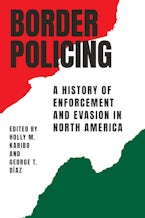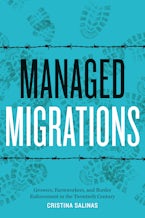Between 1910 and 1920, thousands of Mexican Americans and Mexican nationals were killed along the Texas border. The killers included strangers and neighbors, vigilantes and law enforcement officers—in particular, Texas Rangers. Despite a 1919 investigation of the state-sanctioned violence, no one in authority was ever held responsible.
Reverberations of Racial Violence gathers fourteen essays on this dark chapter in American history. Contributors explore the impact of civil rights advocates, such as José Tomás Canales, the sole Mexican-American representative in the Texas State Legislature between 1905 and 1921. The investigation he spearheaded emerges as a historical touchstone, one in which witnesses testified in detail to the extrajudicial killings carried out by state agents. Other chapters situate anti-Mexican racism in the context of the era's rampant and more fully documented violence against African Americans. Contributors also address the roles of women in responding to the violence, as well as the many ways in which the killings have continued to weigh on communities of color in Texas. Taken together, the essays provide an opportunity to move beyond the more standard Black-white paradigm in reflecting on the broad history of American nation-making, the nation’s rampant racial violence, and civil rights activism.
Foreword (Antonia I. Castañeda)
Acknowledgments
Introduction: Memory, Violence, and History in the 1919 Canales Investigation (Sonia Hernández and John Morán González)
Poem 1. Yo Soy de Frank Rabbaté (Diana Noreen Rivera)
Section I. La Matanza and the Canales Investigation in Context
Chapter 1. Refusing to Forget: A Brief History (Trinidad Gonzales, Benjamin Heber Johnson, and Monica Muñoz Martinez)
Chapter 2. Anglos, Mexicans, and Rangers in Texas, 1850–1900 (Andrew R. Graybill)
Chapter 3. Texas in Four Parts: The Bordered World of 1919 (Walter L. Buenger)
Chapter 4. La Matanza and the Canales Investigation in Comparative Perspective (William D. Carrigan and Clive Webb)
Chapter 5. Representation, Refusal, and Remembrance: Lynching and Extralegal Violence in Mexico and the United States, 1890s–1930s (Gema Kloppe-Santamaría)
Section II. J. T. Canales, Resistance, and Resilience
Chapter 6. The World of Education among Ethnic Mexicans in J. T. Canales’s South Texas (Philis M. Barragán Goetz and Carlos K. Blanton)
Chapter 7. Humanizing La Raza: The Activist Journalism of the Idar Family in Early Twentieth-Century Texas (Gabriela González)
Chapter 8. José Tomás Canales and the Paradox of Power (Richard Ribb)
Chapter 9. J. T. Canales’s Contributions in Law, Civil Rights, and Education, 1920–1976 (Cynthia E. Orozco)
Section III. Reflections on Recovering a History of State Violence and Its Reverberations
Chapter 10. Hidden History: A Journey through the Past, with Hard Lessons for the Present (Kirby F. Warnock)
Chapter 11. Recovering the 1919 Canales Investigation of the Texas Ranger Force: Archival Investigation and Its Consequences, 1975–2010 (James A. Sandos)
Chapter 12. The Legacy of La Matanza, Intergenerational Trauma, and the Writing of El Rinche (Christopher Carmona)
Chapter 13. Stewarding the Personal Narratives of Painful History (Margaret Koch)
Chapter 14. Reckoning with the Past toward the Here and Now (Katherine Hite)
Poem 2. Living Witness (Nati Román)
Epilogue (John Phillip Santos)
Contributors
Index








